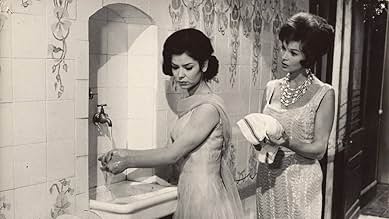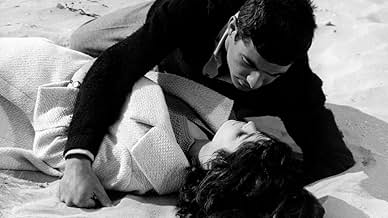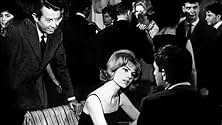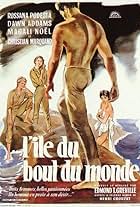Ajouter une intrigue dans votre langueFrédéric, a shy small-town man, falls in love with Anne, a middle class woman married to Didier, who cheats on her with top model Barbara. Catherine, a very determined woman, is secretly in ... Tout lireFrédéric, a shy small-town man, falls in love with Anne, a middle class woman married to Didier, who cheats on her with top model Barbara. Catherine, a very determined woman, is secretly in love with Frédéric and in order to keep him away from Anne, pushes him into Barbara's arms... Tout lireFrédéric, a shy small-town man, falls in love with Anne, a middle class woman married to Didier, who cheats on her with top model Barbara. Catherine, a very determined woman, is secretly in love with Frédéric and in order to keep him away from Anne, pushes him into Barbara's arms. After a while, she gives herself to him. On the other hand, Didier is forced to leave th... Tout lire
Avis en vedette
Freely adapted from Gustave Flaubert ,Astruc -who brilliantly succeeded in adapting Maupassant - made the same mistake as Vadim filming "Les Liaisons Dangereuses" :transposing a work from another century to his era .In the sixties ,a story which was absorbing one hundred years before may become banal ,as common as any (platonic or not)adulterous relations .
Well acted by Brialy,Auclair and Nat,but it is not enough ;it's boring.
'Éducation sentimentale' is defined as being inspired by the novel of the same name, the second famous of Gustave Flaubert. The writers used the characters of the book, but they completely changed the social environment and the time in which the story takes place, one could even say that they changed them from one pole to another. Flaubert's novel took place during the revolutionary movements of 1848, while the film places its action in the contemporaneity of its realization, that is, in the early 1960s. In other words, from the period of the rise and consolidation of the bourgeoisie to the twilight period of this class, as it was perceived in France immediately before 1968. It is a kind of oblique critique of the morals of the great French bourgeoisie, interested only in its own financial interests, decadent in morals and stifling genuine feelings. This is the environment in which the young Frederic Moreau (Jean-Claude Brialy), returning from Algeria, is taken under the protection of the family of the industrialist Dambreuse, makes his professional apprenticeship with him, and falls in love with Anne Arnoux (Marie-José Nat), a friend of the family, married to a corrupt manager. Swinging between three women, one with whom he is in love, another who is in love with him, and the third with whom he has casual relationships, the handsome and talented young man will complete his sentimental education at the risk of beimg left lonely in world where most relationships are intended for immediate pleasure or interest.
The film takes off clumsily, the characters seem to go straight into the action and are not well introduced. The filmmakers may have relied on the fact that viewers know the novel, but this is not true for non-French audiences. But once we understand the relationships between the characters, the story becomes clear and catchy. Alexandre Astruc uses an intriguing cinematic method. The scenes inside are filmed in a fairly conventional style, the ones that directors of the New Wave called 'cinema du papa'. When the heroes and the camera go outside, we are dealing with the characteristic freedom of the 'Nouvelle Vague', mobility, direct sound recordings, and many American cars (as the 'Nouvel Chic' style was knocking on the door). Marie-José Nat, a beautiful and intelligent actress, plays an excellent role of a sensitive and vulnerable woman, who has to decide between love and marital duty, between feelings and social conventions. Jean-Claude Brialy convinced me less, he is too immobile, without conveying feelings. It's a role like the ones played by Alain Delon, but his silences were much more significant. I also liked the soundtrack and the black and white cinema - expressive and fluid, especially in the outdoor scenes. 'Éducation sentimentale' is definitely an interesting film by a director who, in my opinion, gave up too early.
Le saviez-vous
- AnecdotesItalian censorship visa # 37143 dated April 13th 1962
- ConnexionsReferenced in Les échos du cinéma: Episode #1.53 (1961)
Meilleurs choix
Détails
- Date de sortie
- Pays d’origine
- Sites officiels
- Langue
- Aussi connu sous le nom de
- Sentimental Education
- Lieux de tournage
- sociétés de production
- Consultez plus de crédits d'entreprise sur IMDbPro
- Durée1 heure 35 minutes
- Couleur
- Mixage
- Rapport de forme
- 2.35 : 1
Contribuer à cette page




















